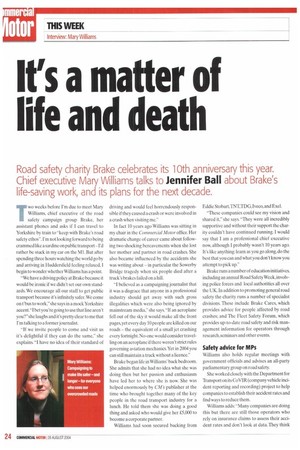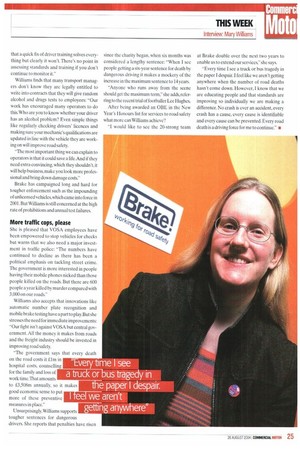it's a matter of life and death
Page 24

Page 25

If you've noticed an error in this article please click here to report it so we can fix it.
Road safety charity Brake celebrates its 10th anniversary this year. Chief executive Mary Williams talks to Jennifer Ball about Brake's life-saving work, and its plans for the next decade.
Two weeks before I'm due to meet Mary Williams, chief executive of the road safety campaign group Brake, her assistant phones and asks if I can travel to Yorkshire by train to "keep with Brake's road safety ethos". I'm not looking forward to being crammed like a sardine on public transport—I'd rather be stuck in my car on the Ml. But after spending three hours watching the world go by and arriving in Huddersfield feeling relaxed, I begin to wonder whether Williams has a point.
"We have a driving policy at Brake because it would be ironic if we didn't set our own standards. We encourage all our staff to get public transport because it's infinitely safer. We come on thus to work," she says in a mock Yorkshire accentlbet you're going to use that line aren't you?" she laughs and it's pretty clear to me that I'm talking to a former journalist.
"If we invite people to come and visit us it's delightful if they can do the same," she explains. "I have no idea of their standard of driving and would feel horrendously responsible if they caused a crash or were involved in a crash when visiting me."
In fact 10 years ago Williams was sitting in my chair in the Commercial Motor office. Her dramatic change of career came about following two shocking bereavements when she lost her mother and partner in road crashes. She also became influenced by the accidents she was writing about — in particular the Sowerby Bridge tragedy when six people died after a truck's brakes failed on a hill.
"I believed as a campaigning journalist that it was a disgrace that anyone in a professional industry should get away with such gross illegalities which were also being ignored by mainstream media," she says." If an aeroplane fell out of the sky it would make all the front pages, yet every day 10 people are killed on our roads — the equivalent of a small jet crashing every fortnight. No-one would consider travelling on an aeroplane if there weren't strict rules governing aviation mechanics Yet in 2004 you can still maintain a truck without a licence."
Brake began life in Williams' back bedroom. She admits that she had no idea what she was doing then but her passion and enthusiasm have led her to where she is now. She was helped enormously by CM'S publisher at the time who brought together many of the key people in the road transport industry for a lunch. He told them she was doing a good thing and asked who would give her £5,000 to become a corporate partner.
Williams had soon secured backing from Eddie Stobart,TNT,TDG,Iveco, and Exel.
"These companies could see my vision and shared it," she says. "They were all incredibly supportive and without their support the charity couldn't have continued running. I would say that I am a professional chief executive now, although I probably wasn't 10 years ago. It's like anything: learn as you go along, do the best that you can and what you don't know you attempt to pick up.'
Brake runs a number of education initiatives, including an annual Road Safety Week, involving police forces and local authorities all over the UK. In addition to promoting general road safety the charity runs a number of specialist divisions. These include Brake Cares, which provides advice for people affected by road crashes; and The Fleet Safety Forum, which provides up-to-date road safety and risk management information for operators through research, seminars and other events.
Safety advice for MPs
Williams also holds regular meetings with government officials and advises an all-party parliamentary group on road safety.
She worked closely with the Department for Transport on its CoVIR (company vehicle incident reporting and recording) project to help companies to establish their accident rates and find ways to reduce them.
Williams adds: "Many companies are doing this but there are still those operators who rely on insurance claims to assess their accident rates and don't look at data. They think that a quick fix of driver training solves everything hut clearly it won't. There's no point in assessing standards and training if you don't continue to monitor it."
Williams finds that many transport managers don't know they arc legally entitled to write into contracts that they will give random alcohol and drugs tests to employees: -Our work has encouraged many operators to do this. Who are you to know whether your driver has an alcohol problem? Even simple things like regularly checking drivers' licences and making sure your mechanic's qualifications are updated in line with the vehicle they are working on will improve road safety.
"The most important thing we can explain to operators is that it could save a life. And if they need extra convincing, which they shouldn't, it will help business, make you look more professional and bring down damage costs."
Brake has campaigned long and hard for tougher enforcement such as the impounding of unlicensed vehicles, which came into force in 2001. But Williams is still concerned at the high rate of prohibitions and annual test failures.
More traffic cops, please She is pleased that VOSA employees have been empowered to stop vehicles for checks but warns that we also need a major investment in traffic police: "The numbers have continued to decline as there has been a political emphasis on tackling street crime. The government is more interested in people having their mobile phones nicked than those people killed on the roads. But there are 600 people a year killed by murder compared with 3,000 on our roads.
Williams also accepts that innovations like automatic number plate recognition and mobile brake testing have a part to play. But she stresses the need for immediate improvements: "Our fight isn't against VOSA but central government. All the money it makes from roads and the freight industry should be invested in improving road safety.
"The government says that every death on the road costs it Lim in hospital costs, counselling for the family and loss of work time.That amounts to £3,508m annually, so it makes good economic sense to put more of these preventive measures in place."
Unsurprisingly. Williams supports tougher sentences for dangerous drivers. She reports that penalties have risen
I ee we aren't
since the charity began, when six months was considered a lengthy sentence: "When I see people getting a six-year sentence for death by dangerous driving it makes a mockery of the increase in the maximum sentence to 14 years "Anyone who runs away from the scene should get the maximum term," she adds, referring to the recent trial of footballer Lee Hughes, After being awarded an OBE in the New Year's Honours list for services to road safety what more can Williams achieve?
would like to see the 20-strong team at Brake double over the next two years to enable us to extend our services," she says.
"Every time I see a truck or bus tragedy in the paper! despair. I feel like we aren't getting anywhere when the number of road deaths hasn't come down. However. I know that we are educating people and that standards are improving so individually we are making a difference. No crash is ever an accident, every crash has a cause, every cause is identifiable and every cause can be prevented. Every road death is a driving force for me to continue." •


























































































































































































